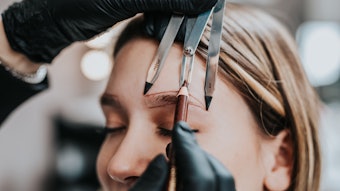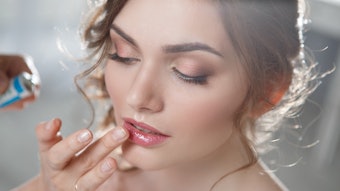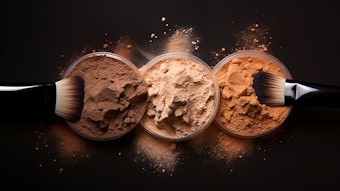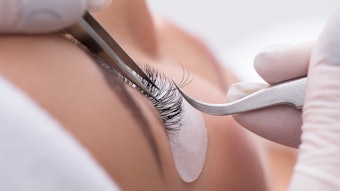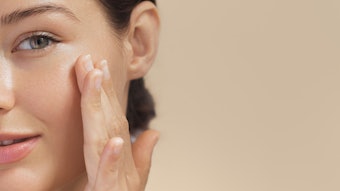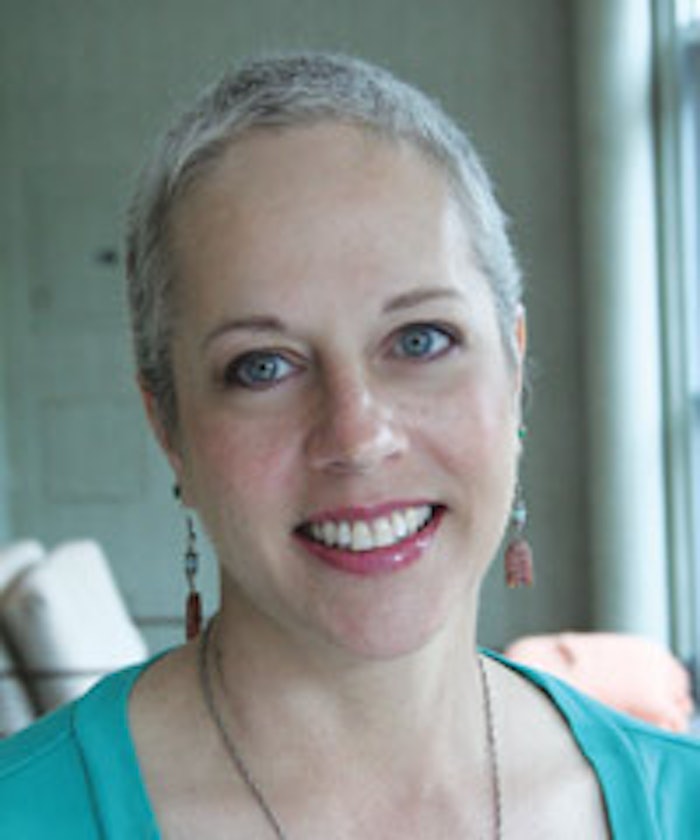
a makeover from makeup artist Annette Goodman using La Bella Donna makeup.
Cancer treatments can wreak havoc with the skin, the body’s largest organ. With this type of challenge, how can skin care professionals help clients who are undergoing cancer treatments overcome the debilitating changes to the skin?
Cancer treatments include the following.
Chemotherapy—Chemotherapy is a systemic treatment, meaning it can attack cells throughout the whole body, including all skin cells of the epidermis and dermis. Very often, the skin becomes extremely dry and sensitive.
Localized radiation—Localized radiation affects cancer cells in the part of the body being treated. It also affects healthy, growing cells in the area being treated, and damage to the healthy cells can cause side effects, such as erythema.
Total body irradiation (TBI)—TBI gives a dose of radiation to the whole body. It can eliminate cancer cells throughout the body, and it also destroys the immune system so that it will not attack the donor’s cells during a transplant. In doing so, the skin barrier and immune cells in the skin are affected.
Biological therapy—This uses portions of the body’s natural immune system to treat a disease. Side effects depend on the type of treatment; however, many affect the skin with a rash. A rash is considered an inflammatory condition of the skin, and there are numerous types of rashes.
Clients will encounter a difficult and emotional time once they have been diagnosed with cancer, and they have to learn how to handle this challenge with grace and positivity. As a skin care professional, what can you do for these clients that will make a difference?
Attitude affects recovery
How your clients look affects how they feel about themselves, and how they feel about themselves can dramatically affect how they feel physically. This is more than a logical argument; it is a proven fact. The significance of the relationship between self-esteem and physical well-being is important to recovering cancer patients. Attitude plays a vital role in recovery. Cancer clients who take control of their appearance can reap rewards that are more than skin deep. Added benefits can include enhanced self-esteem, relief from depression and renewed motivation.
As clients conquer their beauty challenges, each small success is a stepping stone to another small success. Success breeds success, and conquering beauty challenges provides motivation to attack other challenges, the result of which is a resumption of life as they knew it before cancer, or a new and improved version of life as they want it to be from that point forward.
Stress from a cancer diagnosis and treatment has a huge effect on a person as a whole, and with the overall skin condition. A reduction of stress can help improve skin issues. Reducing and controlling stress will aid in the overall improvement of a client’s skin condition. Not only does stress affect skin condition, but it also affects a person’s facial expressions. Consider a tranquil, optimistic person, and note what you see in her face and eyes when compared to a harried, stressed individual. Restore inner calm to repair outer beauty.
Makeup and other accessories
When clients are not feeling well, they do not have the energy to spend hours in front of the mirror doing their makeup on a daily basis. This may require some effort from the client; however, from a psychological standpoint, they may feel a lot better once they have created a look for themselves that boosts their confidence. Also note that not every women who gets cancer uses makeup. There are women that stick to the natural look, and apply minimal makeup. Some may just use lipstick for some color.
It is ideal to keep any makeover natural and healthy-looking. Women undergoing cancer treatment are going to want to look normal under all circumstances, particularly if they are still working during their treatment. As a skin care professional or makeup artist, it is very important to avoid overcompensating by applying heavy makeup, because this will result in an unnatural look. Apply makeup with a light touch. To project a radiant, healthy look, accentuate the positive and conceal the negative.
Some clients will feel more confident if attention is directed away from their lack of eyebrows and hair. There are multiple ways to change this emphasis. Suggest the addition of:
- Jewelry, such as noticeable earrings, necklaces and rings;
- Different colors of makeup to emphasize the eyes or lips; or
- An item of clothing that provides confidence, such as a new scarf, hat or shawl that can attract positive attention.
Boost their confidence
It is always important to care for the skin before adding makeup. Consider these makeup tips when working with the following common skin conditions
for clients with cancer.
Dry and sensitive skin—Ensure the skin itself is sufficiently moisturized before a makeup application, and also confirm that all skin care products and makeup used are formulations with no harmful, toxic or irritating ingredients.
Erythema—This can successfully be covered with the right concealer and foundation. Note that areas of erythema from localized radiation can have tissue changes.
Immunosuppressed client—Sanitation is imperative when working with a client who is immunosuppressed. Makeup should not be dragged on the skin, and it is highly recommended that the skin care professional wear gloves during a makeup application with this type of client. It is also crucial that disposable items are used in the correct manner.
Rashes—Refer clients to a dermatologist for assessment if a rash crops up. If the client has received the go-ahead for a makeup application, ensure you know what rash you are dealing with and use the correct products for the specific rash.
Clients who are undergoing cancer treatment are going to be very appreciative of any skills you can teach them, and a makeup application is certainly going to boost their confidence to face each day. You can use your knowledge to help them stay beautiful inside and out.
REFERENCES
J Sadr, I Jarudi and S Pawan, The role of eyebrows in face recognition, Perception 32 3 285–293 (2003)
Be The Match Foundation: www.marrow.org (Accessed May 2, 2012)
Morag Currin has more than 16 years of spa industry experience, including training and management, and has pioneered an oncology esthetics certification for estheticians. Students learn to incorporate massage techniques for people undergoing cancer therapies, to screen for cancerous skin lesions and to bring cancer survivors’ skin back into balance. Currin developed TecNiche, a skin care line for health-challenged skin, and is the author of two textbooks on oncology esthetics, including Oncology Esthetics: A Practitioner’s Guide (2009).



